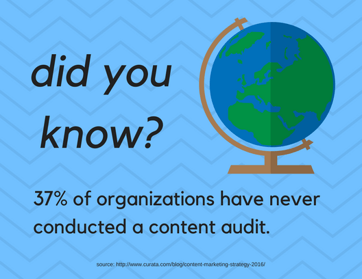Let’s be honest – a constant flow of fresh content alone isn’t always enough to lift your business blog above and beyond the competition.
Even with an ever-expanding arsenal of brand-new content, your blog could be held back by older content riddled with mistakes and outdated SEO behaviors that may be adversely affecting your website’s SERP ranking. It happens to the best of us – even tech giants, like Microsoft, have discovered that as much as 30% of their digital content had simply never been visited.
Fortunately, there’s a convenient way to get to the heart of the problem: the content audit.
A key component of any content development plan, content audits, also known as blog audits or SEO audits, provide invaluable insight into the current state of your website from a content perspective. Keep reading, and we’ll explore the definition of content audit, how these audits are conducted and what your business stands to gain from incorporating content audits into your blog strategy.

What Is a Content Audit?
For digital marketing purposes, a content audit is best defined as a thorough evaluation of every piece of existing website content based on key performance indicators (KPIs) that contribute to the success of your business. Ultimately, a properly executed content audit should help improve your company’s SEO standing and reinforce your status as an authority in your field by ensuring your blog is in pristine condition.
The everyday idea of an audit seems inextricably tied to numbers and finances. But content audits are different – they primarily focus on uncovering qualitative feedback by answering important blogging questions, including, but not limited to:
- Which website content needs to be updated in order to serve the needs of your customers?
- Which content is outdated enough that it should be removed altogether?
- Which content can be consolidated to improve your website’s SEO standing?
- Why do certain blogs perform better than others?
- Which currently untouched topics could be incorporated for additional SEO benefits?
Why Does Your Content Development Strategy Require a Content Audit?
 It might seem easy to shrug off the importance of the content audit, as evidenced by a 2016 Curata survey, which revealed that 37% of participating organizations had never audited their content. After all, so long as you’re creating a consistent stream of blog posts, your ranking should remain high, right?
It might seem easy to shrug off the importance of the content audit, as evidenced by a 2016 Curata survey, which revealed that 37% of participating organizations had never audited their content. After all, so long as you’re creating a consistent stream of blog posts, your ranking should remain high, right?
Unfortunately, it’s not that simple. Pumping out fresh content is an important stepping stone on the path to the top of the SERP, but updating your existing content is essential to ensure that your website remains useful in the long run.
Below, we’ll explore five reasons your blog strategy needs to include regular content audits.
1. Content audits let you repurpose content that’s already created.
Consider the hours your writers have put into the content that’s already on your blog. It’s likely a daunting number. But if these posts aren’t performing up to par, you may have considered crafting new content to replace them – a task that’s equally intimidating.
Content audits offer a simpler path. By auditing your content, you’ll be able to identify older posts that could be totally reinvigorated through a few quick content tweaks and SEO enhancements.
For example, a post entitled “Comprehensive 2016 Guide to Search Engine Optimization” isn’t likely to be a must-click result in, say, 2019, but some of the main ideas within the post may remain relevant. Switching up the title and working the latest SEO trends into the mix shouldn’t take long, and it would leave you with a blog post that’s as good as new. Some content could even be recycled in a different format, like a video or an ebook, to provide a fresh perspective.
2. Content audits refresh your website’s SEO value.
Search engine developers regularly update algorithms and other SERP technologies in order to better serve their users. Frustrating as it may be, these adjustments often lead to changes in SEO ranking, causing formerly well-performing content to drop down the results page.
But as is always the case with SEO, the latest updates will come hand in hand with new best practices. And once your content audit is complete, you should have no problem identifying where these practices must be implemented to circumvent any penalties resulting from recent SEO modifications.
3. Content audits help identify business blog problem areas.
As you conduct your content audit, you’ll begin to see patterns that indicate which behaviors – think headline formats, call-to-action styles, types of blogs, etc. – are successful, as well as which fail to perform. This offers a learning experience that can help improve blog performance not only when creating your new content, but also when updating your older blog posts.
4. Content audits reveal content gaps.
Though we’d like to believe that our blogs have it all, the odds are good that you’re missing a few topics that could provide your website with a competitive edge. A thorough content audit will result in a list of subjects and keywords covered by each post that’s currently found on your blog. Once this list is complete, you can compare your findings to the content present on competing blogs to discover which relevant topics you’ve yet to address.
5. Content audits help ensure consistency throughout your business blog.
Think back to your earliest blog posts. Are they as expertly written as your latest work? Is there a well-established tone that precisely matches your company’s current brand persona?
Probably not. Business blogging is a tough art to master, and as the old adage goes, practice makes perfect. Fortunately, there’s no better time to update (or remove) the content written during your blog’s amateur stages than after a successful content audit. This can prove especially handy when it comes to old blogs that are rich with beneficial information and simply not written in accordance with your website’s current style rules.
Perfect Your Content Strategy with Professional Blogging Services
If your business blog hasn’t received an audit, you might be missing out on innumerable opportunities to maximize your content’s SERP rank. Make sure to check back for the second installment in our content audit series, where we’ll provide you with an in-depth recipe for the perfect content audit.
Sill struggling to get your blog off the ground? Consider a Virtucom Group blogging service package – we’ll begin by discussing the unique needs of your business before crafting high-quality content backed up by thorough research.






